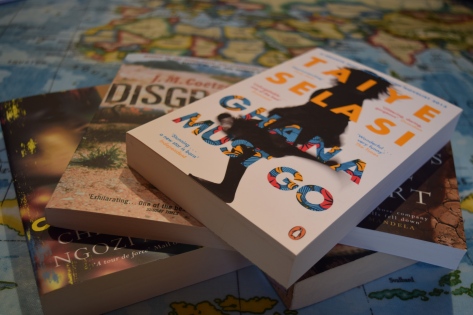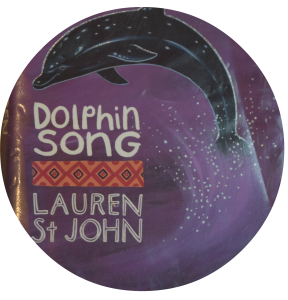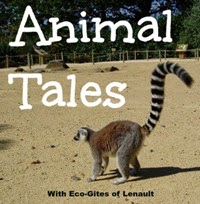A few weeks ago I joined the Africa Reading Challenge and blogged about it here. Since then, I have ordered my first five books – which are:
- Disgrace by JM Coetzee (set in the country we are moving to, South Africa, it was the first of my new books I delved into)
- Ghana Must Go by Taiye Selasi
- Americanah by Chimamanda Ngozi Adichie
- Half of a Yellow Sun by Chimamanda Ngozi Adichie
- Things Fall Apart by Chinua Achebe

I’m happy with my choices so far but realise they are very West/South Africa-centric so will be looking out for literature from the North and East of the continent next.
In the meantime, I recently finished reading Lauren St John’s Dolphin Song to my daughters. As the rules of the challenge say it’s fine to review children’s books, as well as books you’ve read to someone else, I thought I would make this my first review.
Lauren St John is an author of both children and adult fiction, who was born in Zimbabwe but now lives in England. I think the blending of these two cultures was what first attracted my two daughters (who are aged 7 and 9) to her books, as she follows a young British girl moving from her home country to South Africa following the death of her parents in a house fire. She covers this in the first book in the series, The White Giraffe and I was initally worried that this was a big topic to take on for such young children, especially my over-sensitive 7-year-old; but in fact they took it all in their stride and don’t seem to have been overly-worried by the untimely demise of Martine’s parents.
Perhaps this is because StJohn takes the story very quickly into a fantastical place, a safari park near Cape Town, where Martine goes to live and have adventures with – amongst other things – a white giraffe called Jemmy. As well as painting a beautiful picture of a fascinating country – which is perfect for us as we prepare for our move to South Africa – Lauren also weaves in many other important elements of childhood life into her book, including homesickness, starting a new school and bullying.
These are all topics that she continues to cover in her second book, Dolphin Song. In this story, Martine and a group of classmates (including the bullies) are ship-wrecked off the coast of South Africa, rescued by dolphins and end up on an island near Mozambique. As well as the issues visited in her first book – bullying, friendship, different culture, – the author delves deeper into a topic that is obviously close to her heart – conservation. In this book, the children battle to save a pod of beached dolphins and find out why they were stranded. St John ties these messages neatly into the story-line without making it feel too laboured – I don’t think at any point my children felt they were being preached to as they listened to the exciting tale unfold.
 By the end of the book, the children are rescued, have made friends and everyone seems relatively happy. But St John doesn’t sugar-coat and it is made clear that despite their having to come together to survive on the island, Martine does not expect to suddenly be best friends with the former-bullies once they are back at school. One of the dolphins they are trying to rescue also dies, a strong message that nature is a messy and unpredictable thing.
By the end of the book, the children are rescued, have made friends and everyone seems relatively happy. But St John doesn’t sugar-coat and it is made clear that despite their having to come together to survive on the island, Martine does not expect to suddenly be best friends with the former-bullies once they are back at school. One of the dolphins they are trying to rescue also dies, a strong message that nature is a messy and unpredictable thing.
Having finished Dolphin Song, my two children went straight on to read the next books in the Martine quartet – The Last Leopard and The Elephant’s Tale, a sure sign that they have enjoyed these books as much as I did. This partly might be because they are curious about their new home-to-be, but I think there is enough adventure, intrigue and childhood concerns in this book to appeal to all children, wherever they live.
Have you found any relevant fiction books to read to your children before you moved to a new country? Did you find this helped with the transition? Or have you used books like this to help your children cope with things bullying? If anyone has any more children’s fiction set in southern African they would recommend, I would love to hear about it.





